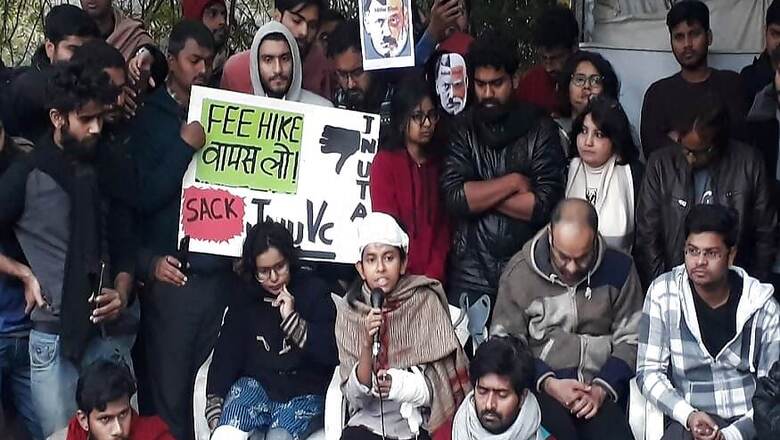
views
New Delhi: Burden of paying contractual employees in state-run educational institutions cannot be put on students and the government has to find the funds, the Delhi High Court said on Friday, asking the Jawaharlal Nehru University to allow those who have not yet registered for the winter session to do so under the old hostel manual.
"The burden of paying contractual employees salary cannot be put on students in government-run institutions. You (varsity) need to find the money. Maybe the Ministry of Human Resource Development can find the funds. The government has to fund public education. It cannot get out of it," Justice Rajiv Shakdher said.
The observation came after Additional Solicitor General Pinky Anand, appearing for JNU, told the court hostel fees were hiked on a direction by the University Grants Commission, to all varsities, that they have to pay salaries of daily wage/contractual/out-sourced staff employed by them.
The ASG, assisted by advocates Harsh Ahuja and Kushal Sharma, said 90 per cent of JNU students have paid the increased fee and it would not be fair to allow the remaining 10 per cent to register for the winter semester as per the older hostel manual.
To this, the court said, "Those who have paid, have paid. If 90 per cent have paid, then your financial concerns have been more or less taken care of. Rest of the funds you can arrange. For now engage with students, have a dialogue with them".
He also issued notices to JNU, the ministry and UGC, seeking their stand on a plea by JNU Students Union against the new hostel manual.
The court said students of the reserved category, who come in the remaining 10 per cent, can also register as per the old manual and they should get registered within a week. It directed the varsity to not levy late payment charges or penalty on students registering after the court's order.
Senior advocate Akhil Sibal, appearing for the students union, told the court since the election of 2018-19, the varsity has stopped engaging with student leaders and their views are being sought "less and less" on issues concerning the students.
The JNUSU office-bearers, in their plea filed through advocate Abhik Chimni, have challenged the minutes of the separate meetings held by the Inter Hostel Administration (IHA), the Executive Council and a high-level committee to amend and later approve the new manual, saying they were not consulted at any stage of the proceedings.
The entire process was conducted in a "tearing hurry" by the varsity, which went ahead and implemented the manual mid-term even as students were involved in talks with the HRD Ministry, Sibal told the court. On this, the court said to JNU it should have included the representatives of the students union in its meetings on amending the hostel manual.
It asked if the HRD Ministry can engage in a dialogue with students why can't the varsity do the same. The JNUSU's petition has sought directions to quash the new hostel manual "illegally approved by the IHA as the decisions taken by the IHA are malafide, arbitrary and illegal and adversely affect the students".
It has claimed the decisions to amend the hostel manual are contrary to provisions of the JNU Act, 1966, Statutes, Ordinances and the Hostel Manual.
"The amendments include reducing JNUSU representation in IHA, increased rates as applicable to hostel residents and also brought amendments to clauses of the Hostel Manual adversely affecting reserved category students in the University," the plea submitted.
Earlier, the rent was Rs 10 and Rs 20 for double and single-occupancy rooms respectively.
The rent for all students, including those with Junior Research Fellowship, Senior Research Fellowship and other equivalent scholarships or fellowships, for single and double-seater rooms has been hiked to Rs 600 and Rs 300 per month.
The rent for Below Poverty Line (BPL) category students for double and single-seater rooms has been increased to Rs 150 and Rs 300 per month respectively. Earlier, there was no utility and service charge, but now the university will charge BPL students Rs 500 and other students Rs 1,000 for the same.
On utility charges, ASG Anand told the court that it has been waived for the current session.
The petition has also challenged the minutes of IHA Meeting which states that mess services sanitation services, room charges, amongst others category of charges will be increased by 10 per cent every academic year.
The Executive Council of JNU showed total "non-application of mind" when creating a 'Below Poverty Line' category of students, the plea contended. On this, the ASG said it was actually economically weaker section (EWS) and not BPL category.


















Comments
0 comment